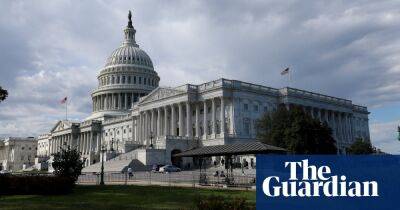Climate bill could slash US emissions by 40% – if Democrats can pass it
The US is, following decades of political rancor and fossil fuel industry obfuscation, on the verge of its first significant attempt to tackle the climate crisis. Experts say it will help rewire the American economy and act as an important step in averting disastrous global heating.
Independent analysis of the proposed legislation, known as the Inflation Reduction Act, shows it should slash America’s planet-heating emissions by about 40% by the end of the decade, compared with 2005 levels.
This cut would bring the US within striking distance of a goal set by Joe Biden to cut emissions in half by 2030, a target that scientists say must be achieved by the whole world if catastrophic global heating, triggering escalating heatwaves, droughts and floods, is to be avoided.
“This is a massive turning point,” said Leah Stokes, a climate policy expert at the University of California, Santa Barbara. “This bill includes so much, it comprises nearly $370bn in climate and clean energy investments. That’s truly historic. Overall, the IRA is a huge opportunity to tackle the climate crisis.”
The climate provisions in the legislation – totaling $369bn, to be exact – are pared back from what Biden initially wanted. Excruciating negotiations with Joe Manchin, the coal company-owning West Virginia senator and a swing vote for the bill, ended up in a reduced compromise.
But its heft can still, argued Brian Schatz, another Democratic senator, be considered “by far, the biggest climate action in human history”. Biden said the bill was a “huge step forward”.
If Democrats are able to muster all 50 of their Senate votes for the bill, overcoming uniform Republican resistance to acting on the climate emergency, billions of dollars will go towards
Read more on theguardian.com























